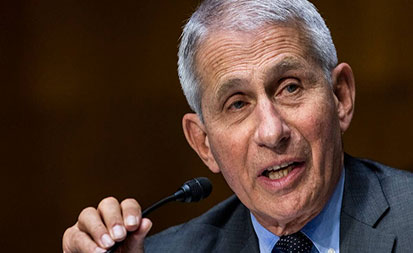Delta variant ‘greatest threat’ to US’ COVID-19 efforts, says Dr Anthony Fauci
The highly contagious Delta variant of the coronavirus is the “greatest threat” to America’s attempt to eradicate the COVID-19 pandemic, White House Chief Medical Advisor Dr Anthony Fauci has warned. Speaking at a White House briefing

The highly contagious Delta variant of the coronavirus is the “greatest threat” to America’s attempt to eradicate the COVID-19 pandemic, White House Chief Medical Advisor Dr Anthony Fauci has warned.
Speaking at a White House briefing on COVID-19 on Tuesday, Fauci said the variant, which was first identified in India, now makes up more than 20 per cent of all new cases in the US, a significant increase from nearly 10 per cent two weeks ago. “Similar to the situation in the UK, the Delta variant is currently the greatest threat in the US to our attempt to eliminate COVID-19,” Fauci told reporters during a virtual news conference here. However, the ‘good news’ is that the US vaccines are effective against the Delta variant, said Fauci, the head of the National Institutes of Allergy and Infectious Diseases (NIAID). ”Conclusion, we have the tools, so let’s use them and crush the outbreak,” he asserted.
The Delta variant recently became the dominant strain in the UK, surpassing the Alpha variant first discovered in the country. The strain makes up more than 90 per cent of new cases and delayed the UK’s scheduled reopening. The transmissibility of Delta variant is unquestionably greater than the wild type SARS-CoV2 as well as the Alpha variant, Fauci said, adding that it is associated with increased disease severity as reflected by hospitalisation risk compared to the Alpha variant.
The Imperial College of London did a study in over 100,000 homes and found that youth were driving the UK’s surge with a five-fold higher positivity among children aged 5-12 and young adults 18-24 years versus people older than 65 years old, he said.
“Look at what is happening in the United States. We have seen, as was the case with B.1.1.7, we seem to be following the pattern with the Delta variant with a doubling time of about two weeks if you look from May 8 with 1.2 to 2.7 to 9.9 and as of a couple of days ago 20.6 per cent of the isolates are Delta,” Fauci said. He said the United States has tools to address the challenge. ”The effectiveness of the vaccines, in this case, two weeks after the second dose of Pfizer BioNTech with 88 per cent effective against the Delta and 93 per cent effective against the Alpha when you are dealing with symptomatic disease,” he said. Rochelle Paula Walensky, the director of the Centers for Disease Control and Prevention, said that CDC continues to follow the prevalence of the Delta variant of COVID-19.
In the last two weeks, the prevalence of cases resulting from the Delta variant has doubled to just over 20 per cent. This variant represents nearly half of all infections, she said. ”This is concerning but expected knowing what we do about how efficiently this variant spreads and by what we saw in the United Kingdom with this variant.
”We know our vaccines work against this variant; however, this variant represents a set of mutations that could lead to future mutations that evade our vaccine, and that is why it is more important than ever to get vaccinated now to stop the chain of infection, the chain of mutations that could lead to a more dangerous variant,” Walensky said.
The US Centers for Disease Control and Prevention has classified the Delta, a highly transmissible COVID-19 variant, as a “variant of concern.” “The B.1.1.7 (Alpha), B.1.351 (Beta), P.1 (Gamma), B.1.427 (Epsilon), B.1.429 (Epsilon), and B.1.617.2 (Delta) variants circulating in the United States are classified as variants of concern. To date, no variants of high consequence have been identified in the United States,” the CDC said in a statement last week.
The World Health Organization classified the Delta variant as a variant of concern on May 10.






